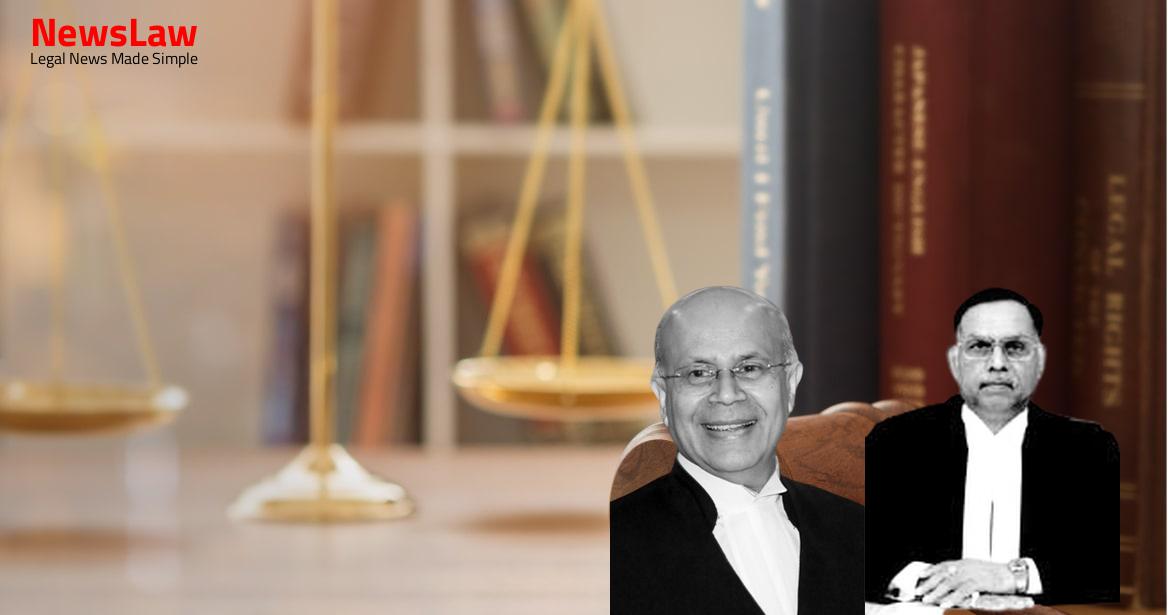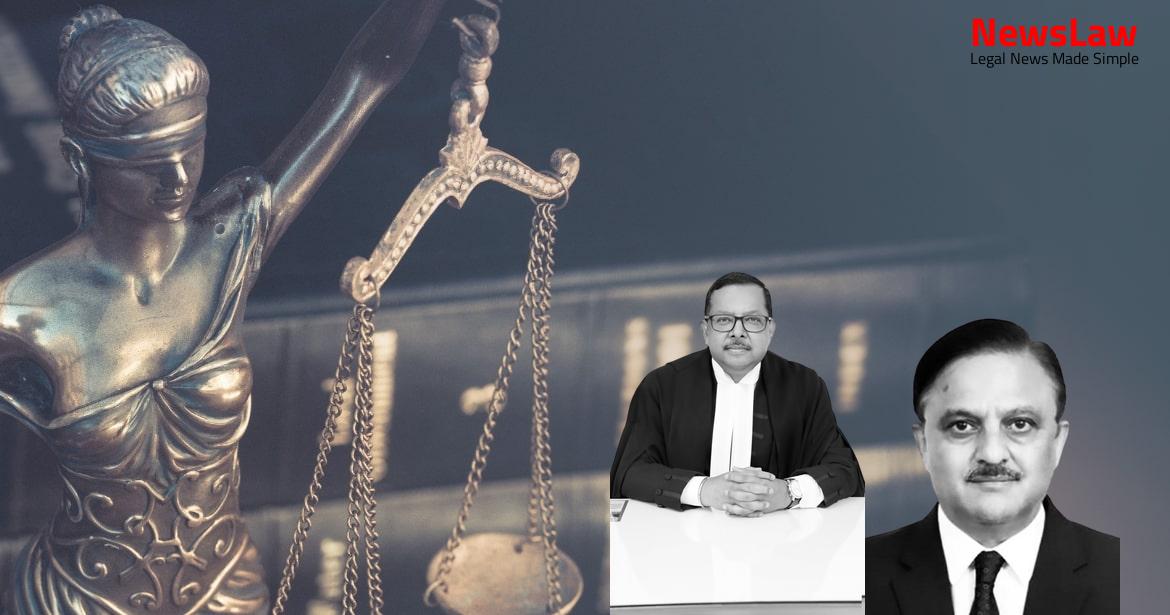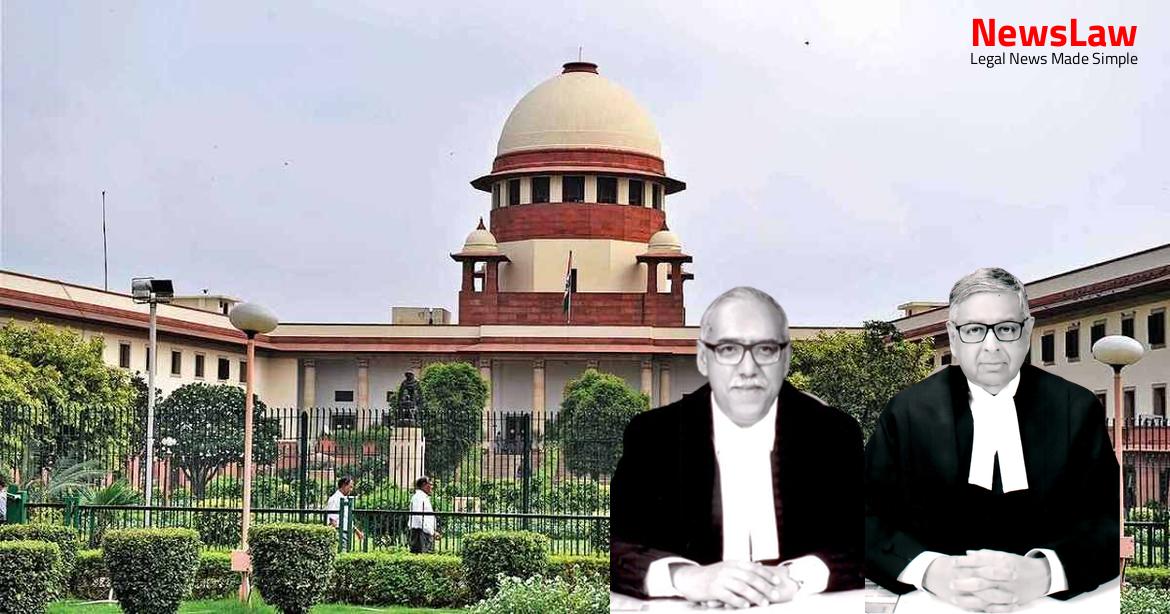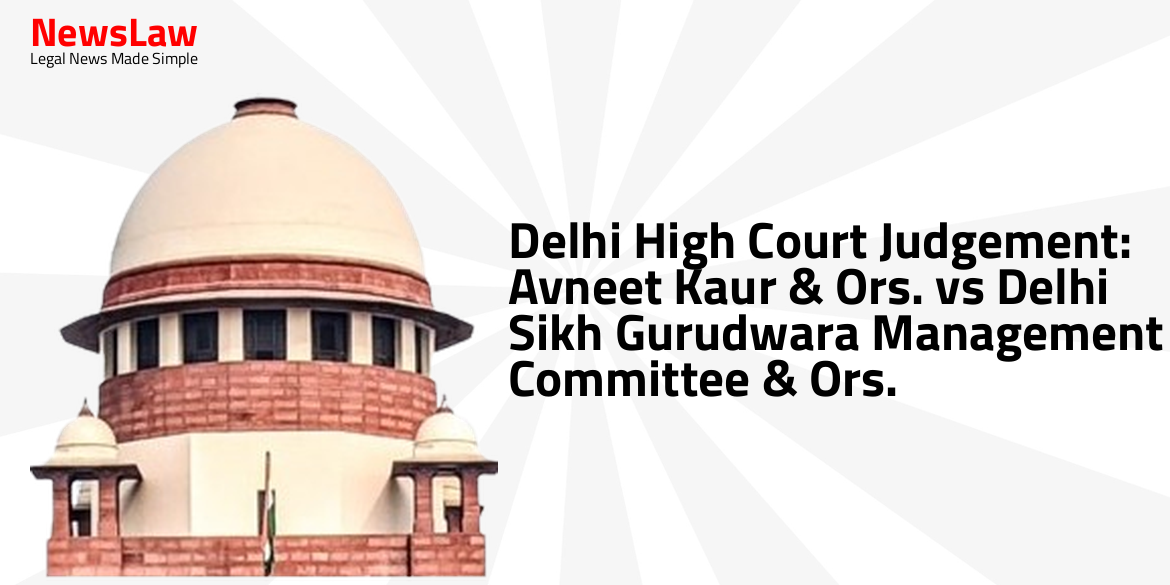In a significant legal development, the Supreme Court of India issued a ruling on an election disqualification and vacancy filling case. The case involved issues related to the election process, disqualification of candidates, and the filling of casual vacancies. Stay informed on the latest legal updates and judgements. #SupremeCourt #LegalCase #ElectionLaw
Facts
- The High Court held that RLC failed to establish a genuine case of discrimination in the selection process for promotion.
- RLC’s contention that the selection criteria were manipulated was rejected by the High Court.
- The High Court found that RLC did not provide sufficient evidence to prove bias or discrimination against him in the promotion process.
- The High Court concluded that RLC’s writ petition lacked merit and dismissed it.
- The appellant filed a complaint before District Caste Certificate Scrutiny Committee.
- The caste certificate of Mrs. Kesharben Murji Patel was invalidated by the committee.
- An election petition was filed challenging Mrs. Patel’s election.
- The High Court permitted the State Election Commission to proceed with preparing the voters list.
- Mrs. Kesharben Murji Patel was disqualified by the Corporation due to her false claim of being a member of a backward class citizen.
- A casual vacancy arose in Ward No.76 due to Mrs. Patel’s disqualification.
- The Small Causes Court was directed to expedite the proceedings of Municipal Election Petition No.52 of 2017.
- The appellant filed a writ petition in the Bombay High Court to quash the notification for by-elections in Ward No.76.
- The High Court dispensed with the filing of affidavits for deciding the appeals.
- Mrs. Kesharben Murji Patel was declared elected as a councillor from Ward No.76.
- The appellant claimed to have secured the second-highest number of votes and should have been declared elected from Ward No.76.
- Various writ petitions were filed seeking different reliefs regarding the election process and notifications.
Also Read: Dispensation with Personal Appearance in Criminal Case: Landmark Judgement by Supreme Court of India
Issue
- The issue at hand is whether the second respondent should be declared duly elected.
- The petitioner argues that there were irregularities in the election process that warrant the second respondent not being declared duly elected.
- Key points of contention include voter intimidation, ballot tampering, and discrepancies in the vote count.
- The court must now assess the evidence presented to determine the validity of these claims.
- The decision on whether to declare the second respondent duly elected will hinge on the court’s findings regarding these issues.
Also Read: Case of Unnatural Death in Matrimonial Home: Supreme Court Judgment
Arguments
- The appellant, as the candidate with the second highest votes, contends they should be declared elected as per Section 33 of the Act, 1888.
- The State Election Commission’s notification for a by-election is challenged as the appellant’s election petition is pending, seeking a declaration of being elected.
- Counsel for the appellant cites precedents such as D. Sanjeevayya Vs. The Election Tribunal, Andhra Pradesh and Others, AIR 1967 SC 1211 to support their argument.
- Allowing a by-election could result in two candidates claiming the same seat if the appellant’s election petition is successful, which goes against the statutory scheme.
- The election petition filed by the appellant does not postpone the filling up of a casual vacancy by the State Election Commission.
- Filling up of a casual vacancy under Section 9 of the Act, 1888 is not dependent on any election petition filed.
- Section 33(2) only applies to the election petition and does not stop or stay the filling up of a casual vacancy.
- The Scheme in the Representation of the People Act, 1951 differs from the Scheme in the Act, 1888, making the judgments relied upon by the appellant irrelevant.
- Returned candidates were disqualified due to invalidation of caste certificate.
- The election petition filed by the Respondent 2 seeks a composite relief, declaring the appellant’s election void and declaring Respondent 2 duly elected.
- In a case like this, the Election Commission is not immediately bound to call for a by-election to fill the vacancy caused by the resignation of the appellant due to lack of specific provisions in the statutory Scheme.
Also Read: The Jodha Ram vs. Kaushaliya Dispute: Supreme Court Judgement Summary
Analysis
- The statutory Scheme under Act, 1888 outlines the process for filling up casual vacancies in local self-government bodies.
- Section 9 of the Act provides for circumstances leading to deemed casual vacancies in office, including disqualification of a councillor.
- The decision to hold byelections for casual vacancies is not compelled by the statute; the Election Commission has discretion in this regard.
- The provision in Section 9 directing that casual vacancies be filled as soon as convenient is subject to the State Election Commission’s discretion.
- A candidate securing the second-highest votes is deemed to be elected in certain circumstances outlined in the statute.
- Section 34 comes into play when an election petition is pending and a candidate claims a declaration in their favor.
- The State Election Commission must consider all relevant factors and apply its discretion before deciding to hold byelections for casual vacancies.
- The statutory Scheme aims to provide opportunities for electors to choose their representatives in situations like setting aside elections or disqualification of returned candidates.
- The Election Commission has the authority to await the result of election petitions before deciding on holding byelections for casual vacancies.
- Section 34(1) deals with the procedure if an election fails or is set aside.
- If no councillor is elected at a general election or to fill a casual vacancy, the State Election Commissioner can appoint another day for a fresh election if there is no other candidate who can be deemed elected in place of the returned candidate.
- The addition of the second part in Section 9 by the 1935 Amendment specifies that the casual vacancy in the office of an elected councillor shall be filled up in the manner provided in Section 34.
- The 1935 Amendment aimed to bring clarity and efficiency in filling up vacancies in the City of Bombay Municipal Act.
- Section 33(2) details the process for contesting elections and the powers of the Chief Judge of the Small Causes Court in cases of disqualification or election invalidation.
- The statutory scheme provides for filling up casual vacancies promptly to ensure continuity in governance.
- Overall, the legislative provisions aim to address scenarios of election failures, disqualifications, and the efficient filling up of casual vacancies in the municipal governance framework.
- The court considered provisions of Section 150 in context of Sections 84 and 98(c).
- The vacancies were categorized as clear vacancies warranting action under Section 151-A of the Act.
- Court held that Election Commission is not bound under Section 150 to hold a by-election.
- The right to elect and be elected are statutory rights.
- References made to judgments in Election Commission of India cases.
- The judgments have to be read in the context of the Representation of the People Act, 1951.
Decision
- Commission issued notification on preparation of voters list for by-election
- No notification issued yet fixing date for by-election of wards in question
- State Election Commission may take a fresh decision before fixing dates for by-election
- Impugned judgment of the High Court is set aside
- State Election Commission may take a fresh decision regarding holding of by-election of the wards in question
- Commission may be asked to take a fresh decision regarding holding of by-elections to fill up casual vacancy
Case Title: NITIN BANDOPANT SALAGRE Vs. THE STATE ELECTION COMMISSION
Case Number: C.A. No.-005855-005855 / 2019



